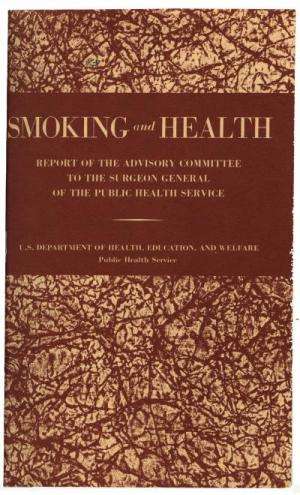This is the cover of the 1964 Surgeon General's Report Credit: The US Department of Health, Education, and Welfare, Public Health Service
The Surgeon General's report of 1964 which outlined, for the first time, the effects of smoking on health, along with the tobacco control efforts that followed, are responsible for adding nearly 20 years of life to eight million people, according to a study in the Jan. 8 issue of JAMA.
"The report and subsequent tobacco control efforts represent the most dramatic and successful public health campaign in modern history, in terms of benefit to the entire population," says the study's senior author, David T. Levy, PhD, a population scientist at Georgetown Lombardi Comprehensive Cancer Center.
"In 1964, more than 40 percent Americans adults smoked, and now, 50 years later, less than 20 percent use cigarettes. Our research suggests that this dramatic reduction is due to the 1964 Surgeon General's report and the tobacco control activity that followed, " he says. "While this is a significant public health achievement, we have much more to do—smoking continues to be the leading contributor to the nation's death toll."
The researchers also estimated that, over the past 50 years, 17.6 million deaths in the United States were related to smoking. Of these deaths, 6.6 million occurred in individuals below the age of 65, implying a large productivity loss due to illness and death during the working ages, Levy says.
The study was conducted by a group of researchers who are part of the Cancer Intervention and Surveillance Modeling Network or CISNET, funded by the National Cancer Institute. CISNET uses statistical modeling to improve understanding of cancer control interventions. The lead investigator of the study is Theodore Holford, PhD, from Yale School of Public Health, and researchers from the University of Michigan and Fred Hutchinson Cancer Research Center also participated.
The research team examined smoking patterns up through 1964 and then modeled mortality rates based on what would likely have happened in the absence of tobacco control. They then compared actual death rates. This resulted in an estimated 157 million years of life saved—19.6 additional years for each smoker who quit.
Tobacco control policies had an impact on John Hilburn of San Antonio. He gave up his two pack-a-day 20-year habit 30 years ago due to two factors—the Surgeon General's warning on his cigarette pack, and an increase in price for a pack of cigarettes. "I thought smoking might be unhealthy, but when I read the warning, I knew it was. I just decided I didn't want to pay $1 a pack to ruin my health," Hilburn says. He threw his carton of cigarettes away, and hasn't smoked since.
"I'm 67 years old and I attribute the health I have to giving up cigarettes," he says.
Levy's research mirrors Hilburn's experience. "Higher taxes on cigarettes have had the most impact on cessation, and smoke-free air laws—prohibiting smoking indoors—have also been very effective."
More information: doi:10.1001/jama.2013.285112
Journal information: Journal of the American Medical Association
Provided by Georgetown University Medical Center





















